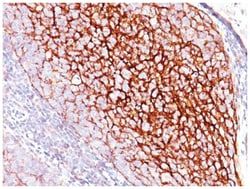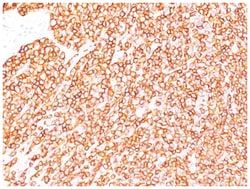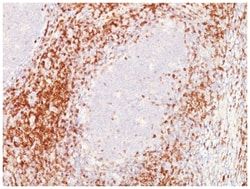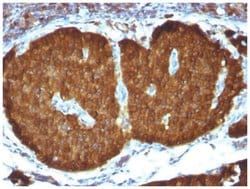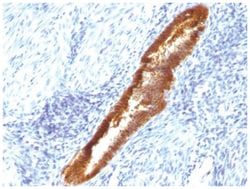Thymidylate Synthase Antibody (TS106 + TMS715), Novus Biologicals™
Mouse Monoclonal Antibody
Manufacturer: Fischer Scientific
The price for this product is unavailable. Please request a quote
Antigen
Thymidylate Synthase
Dilution
Western Blot 0.25-0.5ug/ml, Flow Cytometry 0.5-1ug/million cells, Immunocytochemistry/Immunofluorescence 0.5-1ug/ml, Immunoprecipitation 0.5-1ug/500ug protein lysate, Immunohistochemistry-Paraffin 0.5-1ug/ml, Immunohistochemistry-Frozen 0.5-1ug/ml
Classification
Monoclonal
Form
Purified
Regulatory Status
RUO
Target Species
Human
Gene Accession No.
P04818
Gene ID (Entrez)
7298
Immunogen
Recombinant human thymidylate synthase
Primary or Secondary
Primary
Content And Storage
Store at 4C.
Molecular Weight of Antigen
36 kDa
Clone
TS106 + TMS715
Applications
Western Blot, Flow Cytometry, Immunocytochemistry, Immunofluorescence, Immunoprecipitation, Immunohistochemistry (Paraffin)
Conjugate
Unconjugated
Host Species
Mouse
Research Discipline
Cancer, Cell Cycle and Replication, DNA Repair, DNA replication Transcription Translation and Splicing
Formulation
PBS with 0.05% BSA. with 0.05% Sodium Azide
Gene Alias
EC 2.1.1.45, HsT422, MGC88736, thymidylate synthase, thymidylate synthetase, TMSTsase, TSase, TSHST422
Gene Symbols
TYMS
Isotype
IgG
Purification Method
Protein A purified
Test Specificity
It recognizes a protein of 36kDa, identified as Thymidylate Synthase (TS) (EC 2.1.1.45). TS converts deoxyuridine monophosphate (dUMP) to deoxythymidine monophosphate (dTMP), which is essential for DNA biosynthesis. TS is also a critical target for the fluoropyrimidines, an important group of antineoplastic drugs that are widely used in the treatment of solid tumors. Both 5-FU and fluorodeoxyuridine are converted in tumor cells to FdUMP which inactivates TS by formation of a ternary covalent complex in the presence of the folate cofactor 5,10-methylenetetrahydrofolate. Expression of TS protein is associated with response to 5-fluorouracil (5-FU) in human colorectal, gastric, head and neck, and breast carcinomas.
Description
- Thymidylate Synthase Monoclonal specifically detects Thymidylate Synthase in Human samples
- It is validated for Flow Cytometry, Immunohistochemistry, Immunocytochemistry/Immunofluorescence, Immunohistochemistry-Paraffin.
